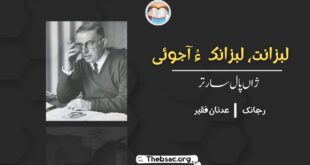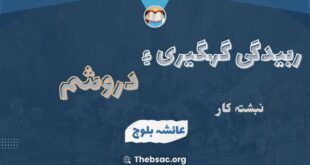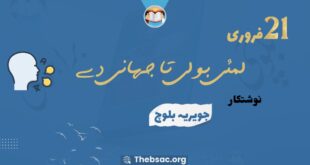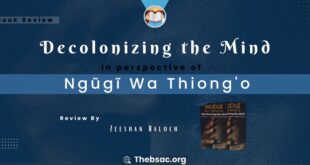Homing Baloch Students Disappeared Through Force from the Educational Institute
Ali Jan Maqsood
From early childhood, we were told: “Don’t speak against injustice or else you will be abducted. Don’t mention the colonizers or else your body will be mutilated and dumped. Don’t voice for your fellow Baloch or else your fate follows theirs. Don’t go in protests or else you will be watched by the state. Don’t post anything on social media or else you will become a poster on social media yourself.” For several years we tried and adopted the suggestions given by our own people. And then those, who said these, began to disappear one after one. Some mutilated bodies returned while others returned with mental and physical tortures. And then they said, “It was our fate.”
How unlucky such a people are. When done with others, it is because they resisted. When it comes to us, it is our luck – a luck written by the oppressors with our consent in one or the other way. In short, whether you are part of an ongoing movement in Balochistan or afar, you are a victim for the identity you own – the Baloch. And this victimisation ends when you are willing to accept things are beyond luck, but are done using the force. If you are the force, you are the writer of the luck – the luck that you pretend exists.
The injustices we are talking of are inflicted on Baloch masses in general, the youth in particular covering more students these days. The worst of all, after the colonization, is the enforced disappearances which have mentally traumatized the people, while the abductees are physically tortured as well – and it is done to further fuel the colonization. Two among the thousands of forcibly disappeared Baloch students are Sohail Baloch and Fassieh Baloch who were abducted two years ago on November 1-2 (2021) from their hostel at the University of Balochistan. CCTV footages were washed off before the so-called investigation had actually begun – days after the disappearances which is a loophole in the legal and justice system itself. And then the acts were followed by the false promises of the then parliamentary committee formed for the specific case led by Abdul Rehman Khetran which reveals how parliamentarians have been directly involved in anti-Baloch policies.
National consciousness, on the other hand, is understanding the need of the hour of the national for the collective welfare. Similarly, enforced disappearances are not an individual’s issue, nor is it a family’s issue neither a clan’s or tribe’s issue. In fact, it has reached to the peak of becoming a national issue. When the nature of the issue is that of national, it ultimately turns out to become a national’s national duty to resist it to the fullest. Quite an unfortunate, but mostly our people complain of not being totally aware of what one’s national duties actually are – or they pretend so in the fear of the colonizer. We need to be clear about one thing: national duties are never told, rather they are felt, observed and practiced.
With various multibillion projects running across Baloch areas under Pakistan, the state’s concerns have always been the Baloch land and the resources, not the Baloch. This philosophy of prioritizing the Baloch land over the general masses was that of the former martial law administer General Zia-Ul-Haq who, in an interview, endorsed that they were more passionate about the Baloch land, not the people living there. Today, after four decades, the Pakistani authorities are following on the same Zia policy and practicing criminal acts against the Baloch masses to take the lead on Baloch soil. But they have not succeeded in an inch of that.
Just to suggest ‘them’ to reread the Baloch history and you will find Baloch among the champions of resistance. The Baloch proudly own Shaheed Khan Mir Mehrab Khan who fought the powerful British forces till the last breath who had come to seize the Baloch land. Balochistan is the land of Yousuf Aziz Magsi for whom his nationals had more value than his assets. They have Khair Bakhsh Marri who inserted in every Baloch the importance of the land and the concept of Baloch nationalism in its true essence. Baloch own Nawab Akbar Khan Bugti who turned to mountains when honor was questioned on Baloch soil. Baloch own Lumma Karima Baloch who changed the meaning and standards of struggle for the Baloch men and women. Baloch have Zahid and Zakir who were/are the icons of the Baloch movement. They have Chairman Ghulam Mohammad who was never tired of preaching Baloch for the struggle. They have Mannan Jan who was the symbol of unity.
Baloch may not have the international community’s support in breaking the shackles of dungeons, but the power of Balochness (Balochiyat) is enough to curb the chains of disappearances. There may be narratives of being tacit to the brutalities, but when it comes to every single Baloch, then everything will be practical – the resistance, the voices, and the consciousness. Because the Baloch issue does not revolve around one area, or one tribe, but it is purely an issue of identity of an entire nation. Amidst the identity crisis, two names are those of Sohail and Fassieh Baloch who own the Baloch identity and are thus in dark caves. And as they say, every dusk has a beautiful dawn: every struggle has a brighter end. Every prison will count for itself.
Sohail and Fassieh may not compromise on their identity as Baloch, while we, on the other, have no choice to do so. Today, and so as in the past, Baloch was synonymous to resistance – in any form. When we say identity is in crisis, it means every Baloch is in crisis: Sohail, Fassieh, me, you and every other Baloch. And be sure, in the months and years of crisis, we, too, can be victims to every brutality that another Baloch is facing, or has to face, if we accept such a brutality as our fate and show zero practicality.
And as narrated by a poet: (Baloch version of the narration) and then Sohail was disappeared, I remained silent. Fassieh was disappeared, I remained silent. Balach was disappeared, I remained silent. Qambar was disappeared, I was silent. And then I was disappeared, and no one remained to make a voice. That’s how the cycle is. It can only be broken through collective struggle. So, let’s begin our struggle – if you have not already – by being a solid voice for Sohail Baloch and Fassieh Baloch who complete two years of forced detention by security forces.
 BSAC Struggling For Knowledge And Unity
BSAC Struggling For Knowledge And Unity 



